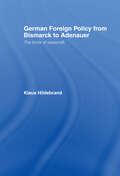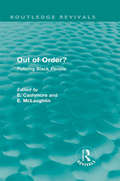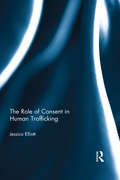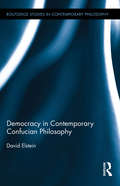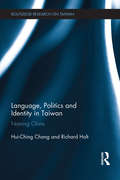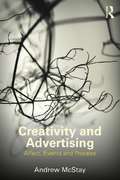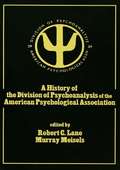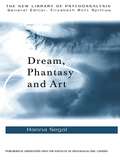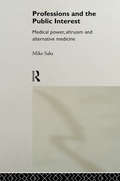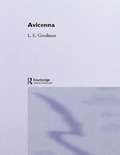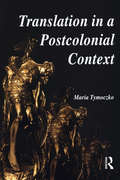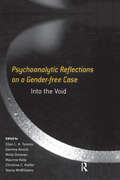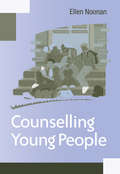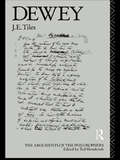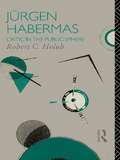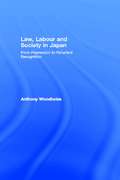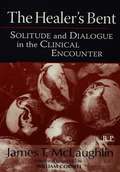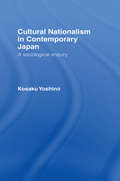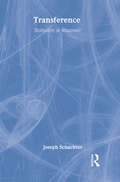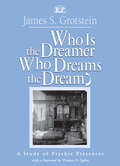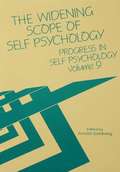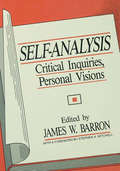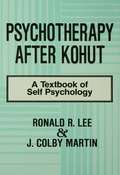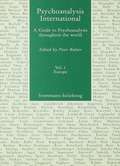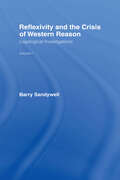Special Collections
Benetech’s Global Certified Accessible Titles
Description: Benetech’s GCA program is the first independent third-party EPUB certification to verify ebook accessibility. By creating content that is born accessible, publishers can meet the needs of all readers. Learn more: https://bornaccessible.benetech.org/
- Table View
- List View
German Foreign Policy
by Klaus HilderbrandFirst Published in 1989. Routledge is an imprint of Taylor & Francis, an informa company.
Out of Order?
by E. Cashmore and E. McLaughlinFirst published in 1991, this book evaluates and compares the problematic relationships that have sometimes existed between police and Afro-Caribbean people in Britain and in the United States of America. Contributors from both sides of the Atlantic assess conflicting claims from police and black communities, as to whether some police are racist or too brutal in their operations. Although this book was written in the early 90s, many of the issues discussed remain interesting and relevant to our society today.
The Role of Consent in Human Trafficking
by Jessica ElliottHuman trafficking is consistently featured on the global political agenda. This book examines the trafficking of adult female victims for sexual exploitation, and specifically the understanding of consent and its influence in the identification and treatment of trafficking victims. Jessica Elliott argues that when applied to situations of human trafficking, migration and sexual exploitation, the notion of consent presents problems which current international laws are unable to address. Establishing the presence of 'coercion' and a lack of consent can be highly problematic, particularly in situations of human trafficking and exploitative prostitution; activities which may be deemed inherently coercive and problematically clandestine. By examining legal definitions of human trafficking in international instruments and their domestic implementation in different countries, the book explores victimhood in the context of exploitative migration, and argues that no clear line can be drawn between those who have been smuggled, trafficked, or 'consensually trafficked' into a situation of exploitation. The book will be great use and interest to students and researchers of migration law, transnational criminal law, and gender studies.
Democracy in Contemporary Confucian Philosophy
by David ElsteinThis book examines democracy in recent Chinese-language philosophical work. It focuses on Confucian-inspired political thought in the Chinese intellectual world from after the communist revolution in China until today. The volume analyzes six significant contemporary Confucian philosophers in China and Taiwan, describing their political thought and how they connect their thought to Confucian tradition, and critiques their political proposals and views. It illustrates how Confucianism has transformed in modern times, the divergent understandings of Confucianism today, and how contemporary Chinese philosophers understand democracy, as well as their criticisms of Western political thought.
Language, Politics and Identity in Taiwan
by Richard Holt and Hui-Ching ChangFollowing the move by Chiang Kai-shek and the Chinese Nationalist Party Kuomingtang (KMT) to Taiwan after losing the Chinese civil war to the Chinese Communist Party (CCP) in the late 1940s, and Chiang’s subsequent lifelong vow to reclaim the mainland, "China " has occupied—if not monopolized—the gaze of Taiwan, where its projected images are reflected. Whether mirror image, shadow, or ideal contrast, China has been, and will continue to be, a key reference point in Taiwan's convoluted effort to find its identity. Language, Politics and Identity in Taiwan traces the intertwined paths of five sets of names Taiwan has used to name China since the KMT came to Taiwan in 1949: the derogatory "Communist bandits"; the ideologically focused "Chinese Communists"; the seemingly neutral geographical designators "mainland" and "opposite shore/both shores"; and the ethnic and national label "China," with the official designation, "People's Republic of China." In doing so, it explores how Taiwanese identities are constituted and reconstituted in the shifting and switching of names for China; in the application of these names to alternative domains of Taiwanese life; in the waning or waxing of names following tides of history and polity; and in the increasingly contested meaning of names. Through textual analyses of historical archives and other mediated texts and artifacts, the chapters chart Taiwan's identity negotiation over the past half century and critically evaluate key interconnections between language and politics. This unique book will be of great interest to students and scholars of Taiwan studies, Chinese politics, communication studies and linguistics.
Creativity and Advertising
by Andrew McStayCreativity and Advertising develops novel ways to theorise advertising and creativity. Arguing that combinatory accounts of advertising based on representation, textualism and reductionism are of limited value, Andrew McStay suggests that advertising and creativity are better recognised in terms of the ‘event’. Drawing on a diverse set of philosophical influences including Scotus, Spinoza, Vico, Kant, Schiller, James, Dewey, Schopenhauer, Whitehead, Bataille, Heidegger and Deleuze, the book posits a sensational, process-based, transgressive, lived and embodied approach to thinking about media, aesthetics, creativity and our interaction with advertising. Elaborating an affective account of creativity, McStay assesses creative advertising from Coke, Evian, Google, Sony, Uniqlo and Volkswagen among others, and articulates the ways in which award-winning creative advertising may increasingly be read in terms of co-production, playfulness, ecological conceptions of media, improvisation, and immersion in fields and processes of corporeal affect. Philosophically wide-ranging yet grounded in robust understanding of industry practices, the book will also be of use to scholars with an interest in aesthetics, art, design, media, performance, philosophy and those with a general interest in creativity. Andrew McStay lectures at Bangor University and is author of Digital Advertising, and The Mood of Information: A Critique of Online Behavioural Advertising and Deconstructing Privacy, the latter forthcoming in 2014.
A History of the Division of Psychoanalysis of the American Psychological Associat
by Robert C. Lane and Murray MeiselsIn 1909, G. Stanley Hall, the founder of the American Psychological Association, invited Sigmund Freud, Sandor Ferenczi, Carl Jung, and Ernest Jones to Clark University to present their understanding of psychoanalysis. Although their presentations were enthusiastically received by many, the discrepancy with what was then considered the mainline American psychological thought was too great and the two fields remained separate. The formation of the Division of Psychoanalysis in 1979 -- seventy years later -- had as a major goal a rapprochement between psychoanalysis and psychology. Analytically trained psychologists and those seeking training have responded with enthusiasm to the formation of the Division, which now numbers 3,500 members in thirteen short years. This volume records the history of the Division and the seminal contributions of its founding members. It describes the dynamic tensions that have existed over the years between differing clinical and theoretical concepts of psychoanalysis leading to creative dialogue.
Dream, Phantasy and Art
by Hanna SegalHanna Segal's work, especially on symbolism, aesthetics, dreams, and the exploration of psychotic thinking, has established her as an outstanding figure in psychoanalysis, particularly in psychoanalysis of the Kleinian tradition. In Dream, Phantasy and Art she reworks her ideas on these topics and brings them vividly alive in a new integration which links them afresh to the work of Freud, Klein, and Bion. Throughout the book, the clinical illustrations the author has selected brilliantly spotlight the theory, touching the imagination, and fixing even the most difficult ideas permanently in the reader's mind. In a mutually enhancing relationship, theory and clinical example are combined, and then applied, to create the author's new and original theories of art and aesthetics. As Betty Joseph notes in her foreword, Segal's writing, and in particular this book, does much to enrich psychoanalysis not only because of the clarity and intelligence but also because of the depth and breadth of her interests and her clinical imagination.
Professions and the Public Interest
by Mike SaksThe importance and influence of professions in public life has grown increasingly over the twentieth century but the question of whether they subordinate their own self-interests to the public interest has yet to be adequately researched within a major sociological perspective. In Professions and the Public Interest Mike Saks develops a theoretical and methodological framework for assessing professional groups in Western society. The empirical applicability of this framework is demonstrated with particular reference to a novel case study of the response of the medical profession to acupuncture in the nineteenth and twentieth centuries. Professions and the Public Interest will be of great interest to all lecturers and students of social policy, sociology, and medical sociology as well as to professional groups and their members.
Avicenna
by L E Goodmanthe philosophers in the West, none, perhaps, is better known by name and less familiar in actual content of his ideas than the medieval Muslim philosopher, physician, minister and naturalist Abu Ali Ibn Sina, known since the days of the scholastics as Avicenna. In this book the author, himself a philosopher, and long known for his studies of Arabic thought, presents a factual account of Avicenna's philosophy. Setting the thinker in the context of his often turbulent times and tracing the roots and influences of Avicenna's ideas, this book offers a factual philosophical portrait. It details Avicenna's account of being as a synthesis between the seemingly irreconcilable extremes of Aristotelian eternalism and the creationism of monotheistic scripture. It examines Avicenna's distinctive theory of knowledge, his ideas about immortality and individuality, including the famous "floating man argument", his contributions to logic, and his probing thoughts on rhetoric and poetics.
Translation in a Postcolonial Context
by Maria TymoczkoThis ground-breaking analysis of the cultural trajectory of England's first colony constitutes a major contribution to postcolonial studies, offering a template relevant to most cultures emerging from colonialism. At the same time, these Irish case studies become the means of interrogating contemporary theories of translation. Moving authoritatively between literary theory and linguistics, philosophy and cultural studies, anthropology and systems theory, the author provides a model for a much needed integrated approach to translation theory and practice. In the process, the work of a number of important literary translators is scrutinized, including such eminent and disparate figures as Standishn O'Grady, Augusta Gregory and Thomas Kinsella. The interdependence of the Irish translation movement and the work of the great 20th century writers of Ireland - including Yeats and Joyce - becomes clear, expressed for example in the symbiotic relationship that marks their approach to Irish formalism. Translation in a Postcolonial Context is essential reading for anyone interested in translation theory and practice, postcolonial studies, and Irish literature during the 19th and 20th centuries.
Psychoanalytic Reflections on a Gender-free Case
by Nancy McWilliams and Christine C. Kieffer and Ellen L. K. Toronto and Gemma Ainslie and Molly Donovan and Maurine KellyThe past two decades of psychoanalytic discourse have witnessed a marked transformation in the way we think about women and gender. The assignment of gender carries with it a host of assumptions, yet without it we can feel lost in a void, unmoored from the world of rationality, stability and meaning. The feminist analytic thinkers whose work is collected here confront the meaning established by the assignment of gender and the uncertainty created by its absence. The contributions brought together in Psychoanalytic Reflections on a Gender-free Case address a cross-section of significant issues that have both chronicled and facilitated the changes in feminist psychoanalysis since the mid 1980s. Difficult issues which have previously been ignored (such as the pregnancy of the therapist or sexual abuse regarded as more than a fantasy) are considered first. The book goes on to address family perspectives as they interact and shape the child’s experience of growing up male or female. Other topics covered are the authority of personal agency as influenced by the language and theory of patriarchy, male-centred concepts that consistently define women as inferior, and the concept of gender as being co-constructed within a relationship. The gender-free case presented here will fascinate all psychoanalysts interested in exploring ways of grappling with the elusive nature of gender, as well as those studying gender studies.
Counselling Young People
by Ellen Noonan and Ms Ellen NoonanBased on the author's experience as psychotherapist and counsellor, this book provides an approachable introduction to the field of counselling young people for anyone undertaking counselling within organisations such as schools, universities, the social services or industry
Dewey
by TilesFirst Published in 1990. Routledge is an imprint of Taylor & Francis, an informa company.
Jurgen Habermas
by Robert C. HolubThe most important intellectual in the Federal Republic of Germany for the past three decades, Habermas has been a seminal contributor to fields ranging from sociology and political science to philosophy and cultural studies. Although he has stood at the centre of concern in his native land, he has been less readily accepted outside Germany, particularly in the humanities. His theoretical work postulates the centrality of communication and understanding, and as such his strategy of debate is marked by a politically informed unity of theory and practice. Holub's book is the first detailed account of the major debates in which Habermas has engaged since the early sixties. It stems from the conviction that his critics have not understood the political strategy behind his various interventions, or the consistency that informs his intellectual activities. Habermas is viewed in dialogue with important philosophical, sociological and political currents in West Germany. Holub demonstrates how Habermas pursues a course that incorporates various aspects of his opponents' positions, while simultaneously defending perceived threats to democracy and open discussion.
Law, Labour and Society in Japan
by Anthony WoodiwissAs Japanese companies establish overseas production facilities at an ever more repid pace, it is increasingly important for people in the host countries to understand the preconceptions upon which the Japanese approach to industrial relations is based. This book traces the development of Japanese labour law and shows how labour law has been related to the prevailing social, economic and political circumstances.
The Healer's Bent
by James McLaughlinOver the course of a 50-year career, James T. McLaughlin has sought to open the playing field of psychoanalytic exploration by treating unconscious processes as the very material from which we fashion meaningful lives. His unique, iconoclastic perspective, which challenged the conventions of his time and professional milieu, not only engages the creative tension between the stance of the analyst and the stance of the healer, but also contains striking intimations of contemporary relational and interpersonal models of psychoanalytic treatment. The Healer's Bent, which thematically integrates published and unpublished papers and contains three chapters of heretofore unpublished autobiographical reflection, bridges analytic practice and other psychotherapeutic modalities. It will make McLaughlin's distinct approach to clinical theory and practice widely available to a broad and receptive readership.
Cultural Nationalism in Contemporary Japan
by Kosaku YoshinoThe debate about Japan's 'uniqueness' is central to Japanese studies. This book aims to illuminate that debate from a comparative and theoretical perspective. It also tests theories of ethnicity and cultural nationalism through the use of Japan as a case study.Yoshino examines how ideas of national distinctiveness are `produced' and `consumed' in Japanese society through a study of intellectuals, teachers and businessmen. He finds that ideas of Japanese uniqueness, the nihonjinron, have been embraced more by those in business than in education. He looks at the Japanese perception of their own 'uniqueness' and at the ways in which ideas of cultural distinctiveness are formulated in different national and historical contexts.This extremely readable book combines anthropology and sociology to present both a historical analysis of the roots of the Japanese sense of national identity and a discussion of the ways in which that sense is changing.
Transference
by Joseph SchachterThe theory of transference and the centrality of transference interpretation have been hallmarks of psychoanalysis since its inception. But the time has come to subject traditional theory and practice to careful, critical scrutiny in the light of contemporary science. So holds Joseph Schachter, whose Transference: Shibboleth or Albatross? undertakes this timely and thought-provoking task. After identifying the weaknesses and inconsistencies in Freud's original premises about transference, Schachter demonstrates how contemporary developmental research across a variety of domains effectively overturns any theory that posits a linear deterministic relationship between early childhood and adult psychic functioning, including the adult patient's treatment behavior toward the analyst. No less trenchantly, he shows how contemporary chaos theory complements developmental research by making the very endeavor of historical reconstruction - of backward prediction - suspect on logical grounds. Nor, Schacter continues, does the clinical evidence normally adduced in support of transference theory provide the firm bedrock of data that most analysts suppose to exist. What one finds, he holds, are endlessly reiterated claims of identifying determining historical antecedents sustained only by descriptions of current behaviors through a gloss of theory. Less a polemic than a call to order, Transference: Shibboleth or Albatross? is cogently argued and straightforwardly written. It is destined to be a thorn in the side of analysts who resist change and a spur to those who seek to bring analytic theory into closer alignment with contemporary science in the interest of improves treatment efficacy.
Who Is the Dreamer, Who Dreams the Dream?
by James S. GrotsteinIn Who Is the Dreamer Who Dreams the Dream? A Study of Psychic Presences, James Grotstein integrates some of his most important work of recent years in addressing fundamental questions of human psychology and spirituality. He explores two quintessential and interrelated psychoanalytic problems: the nature of the unconscious mind and the meaning and inner structure of human subjectivity. To this end, he teases apart the complex, tangled threads that constitute self-experience, delineating psychic presences and mystifying dualities, subjects with varying perspectives and functions, and objects with different, often phantasmagoric properties. Whether he is expounding on the Unconscious as a range of dimensions understandable in terms of nonlinear concepts of chaos, complexity, and emergence theory; modifying the psychoanalytic concept of psychic determinism by joining it to the concept of autochthony; comparing Melanie Klein's notion of the archaic Oedipus complex with the ancient Greek myth of the labyrinth and the Minotaur; or examining the relationship between the stories of Oedipus and Christ, Grotstein emerges as an analyst whose clinical sensibility has been profoundly deepened by his scholarly use of mythology, classical thought, and contemporary philosophy. The result is both an important synthesis of major currents of contemporary psychoanalytic thought and a moving exploration of the nature of human suffering and spirituality.
Progress in Self Psychology, V. 9
by Arnold GoldbergThe Widening Scope of Self Psychology is a watershed in the self-psychological literature, being a contemporary reprise on several major clinical themes through which self psychology, from its inception, has articulated its challenge to traditional psychoanalytic thinking. The volume opens with original papers on interpretation by eminent theorists in the self-psychological tradition, followed by a series of case studies and clinically grounded commentaries bearing on issues of sex and gender as they enter into analysis. Two thoughtful reexaminations of the meaning and treatment challenges of chronic rage are followed by clinical papers that focus, respectively, on mourning, alter ego transferences, resistance to change, and pathological identification. Applied analytic contributions and a review of Goldberg's The Prisonhouse of Psychoanalysis round out a collection that testifies not only to the widening scope of self psychology, but to its deepening insights as well.
Self-Analysis
by James W. BarronSelf-Analysis is a fascinating reprise on the mode of disciplined self-inquiry that gave rise to psychoanalysis. From Freud's pioneering self-analytic efforts onward, self-analysis has been central to psychoanalytic training and psychoanalytic practice. Yet, only in recent years have analysts turned their attention to this wellspring of Freud's creation. The contributors to Self-Analysis represent diverse theoretical perspectives, but they share a common appreciation of the importance of self-analysis to the analytic endeavor. Their papers encompass systematic inquiries into the capacity for self-analysis, examples of self-analysis as an aspect of clinical work, and personal reflections on the role of self-analysis in professional growth. Among the questions explored: What do we mean by self-analysis? To what extent and under what conditions is self-analysis possible? How does it differ from ordinary introspection? What are the developmental antecedents of the capacity for self-analysis? What is the role of the "other" in self-analysis? What are the relationships among self-analysis, writing, and creativity? As Barron observes, the contributors to the book "grapple with the formidable ambiguities of self-analysis without either idealizing or devaluing its potential." What emerges from their effort is not only an illuminating window into the psychoanalyst's subjectivity as a fact of clinical life, but a far-reaching exemplification of the ways in which self-understanding is always a constitutive part of our understanding of others.
Psychotherapy After Kohut
by Ronald R. Lee and J. Colby MartinHailed as "a superb textbook aimed at introducing psychoanalytic self psychology to students of psychotherapy" (Robert D. Stolorow), Psychotherapy After Kohut is unique in its grasp of the theoretical, clinical, and historical grounds of the emergence of this new psychotherapy paradigm. Lee and Martin acknowledge self psychology's roots in Freud's pioneering clinical discoveries and go on to document its specific indebtedness to the work of Sandor Ferenczi and British object relations theory. Proceeding to readable, scholarly expositions of the principal concepts introduced by Heinz Kohut, the founder of self psychology, they skillfully explore the further blossoming of the paradigm in the decade following Kohut's death. In tracing the trajectory of self psychology after Kohut, Lee and Martin pay special attention to the impact of contemporary infancy research, intersubjectivity theory, and recent empirical and clinical findings about affect development and the meaning and treatment of trauma.
Psychoanalysis International, V.1
by Peter KutterIt is well known that the cradle of psychoanalysis was in Vienna, the scene of Sigmund Freud's activities at the beginning of the century. But how and when did psychoanalysis reach the other countries of Europe? What development did it undergo there? How did the different mentalities, political and cultural backgrounds as well as the personal particularities of its respective advocates affect psychoanalysis? What was its position in the past and what is its position today? These and other questions on the varied development and the present situation of psychoanalysis in the countries of eastern and western Europe are investigated by renowned psychoanalysts drawing on the experience and knowledge acquired in their own work. The result is a new conpendium on psychoanalysis in Europe containing all up-to-date information. Informative and instructive, at times as exciting as a detective story, Psychoanalysis International will possibly be of interest even to non-analysts.
Reflexivity And The Crisis of Western Reason
by Barry SandywellThis ground breaking work explores the genealogical analysis of the discourses of reflection. Barry Sandywell traces the differences between the traditional discourses of reflection and the experiences of reflexivity in everyday, social and philosophical thought. Brilliantly organised and abounding with astonishing insights, Reflexivity and the Crisis of Western Reason offers a fundamental challenge to our normal ways of viewing social thought.
